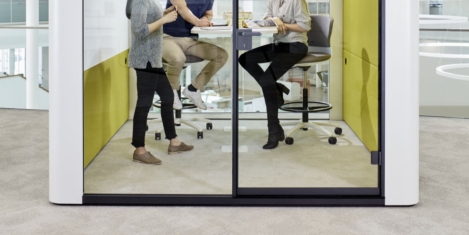August 7, 2023
Sedus office cube solutions: a symbiosis of proximity and distance
 Open space concepts, flexibility and new working styles will continue to be defining characteristics of the office of the future. They offer a number of advantages by eroding entrenched structures and supporting collaboration and communication. When people work in close proximity, with flexible meetings and spontaneous exchanges, they are able to determine the shape of each working day. Employees are increasingly deciding for themselves where and how they can best manage their tasks. Concentrated individual work shifts seamlessly into collaborative work and teamwork precedes periods of retreat or relaxation. For certain tasks, focus, silence and a sense of distance from the outside environment are essential. The office cube solution is one way of insulating people from interruptions and unwelcome noise. As an enclosed cubicle and thanks to its acoustically effective components, se:cube from Sedus can minimise acoustic and visual disruption. More →
Open space concepts, flexibility and new working styles will continue to be defining characteristics of the office of the future. They offer a number of advantages by eroding entrenched structures and supporting collaboration and communication. When people work in close proximity, with flexible meetings and spontaneous exchanges, they are able to determine the shape of each working day. Employees are increasingly deciding for themselves where and how they can best manage their tasks. Concentrated individual work shifts seamlessly into collaborative work and teamwork precedes periods of retreat or relaxation. For certain tasks, focus, silence and a sense of distance from the outside environment are essential. The office cube solution is one way of insulating people from interruptions and unwelcome noise. As an enclosed cubicle and thanks to its acoustically effective components, se:cube from Sedus can minimise acoustic and visual disruption. More →









 After two years on Brighton seafront,
After two years on Brighton seafront, 

























August 1, 2023
How many fingers am I holding up?
by Mark Eltringham • Comment